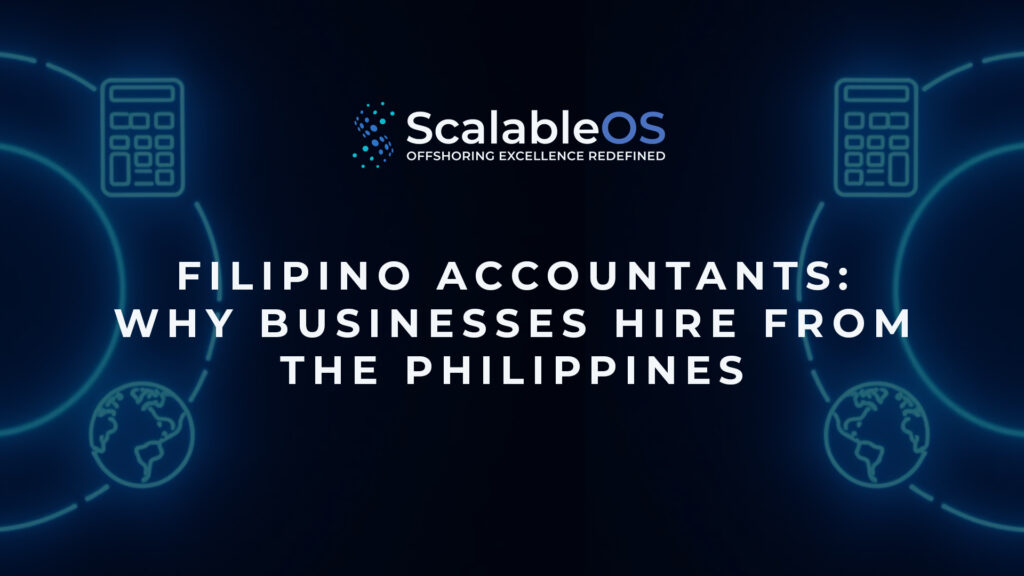Managing finances while growing a business can feel overwhelming—hiring local talent is expensive, and finding people with the right expertise isn’t easy. That’s why more companies are turning to the Philippines for accounting support.
Filipino accountants have proficient English skills, global certifications, and an ability to collaborate effectively with international teams. Combined with the Philippines’ cost-effective labor market and cultural compatibility with Western businesses, it’s easy to see why the country is a leading destination for finance outsourcing.
This guide explains why hiring a Filipino accountant is a smart and scalable decision.
Why the Philippines is a Top Destination for Finance Outsourcing?
The Philippines checks all the boxes in finance outsourcing—a vast talent pool, a mature outsourcing infrastructure, supportive government policies, and a time zone that supports 24/7 operations.
Here’s a closer look at why more companies see the country as their go-to destination for accounting and finance roles.
1. A deep bench of skilled accounting professionals
The Philippines is home to over 200,000 licensed certified public accountants (CPAs), with thousands more graduating from top universities each year.
These professionals are well-versed in local and international accounting standards, including IFRS, US GAAP, and Australian Accounting Standards. Thus, they’re capable of handling cross-border finance operations with precision.
2. Established BPO and KPO ecosystem
The country’s business process outsourcing (BPO) and knowledge process outsourcing (KPO) sectors are among the most advanced globally. With decades of experience, they‘ve developed reliable systems, secure infrastructure, and robust training programs that help finance professionals adapt quickly to diverse business requirements.
Many outsourcing firms already specialize in finance and accounting services, offering a range of services from bookkeeping to financial analysis.
3. Government support and investment incentives
When you outsource to the Philippines, you can benefit from favorable government policies. Agencies such as the Philippine Economic Zone Authority (PEZA) and the Board of Investments (BOI) tax holidays, simplified import/export procedures, and investment assistance.
These policies make it easier and more cost-effective to establish or scale offshore operations in the country.
4. Strong educational foundation in finance and accounting
Filipino accountants train at prestigious institutions such as the University of the Philippines (UP), De La Salle University (DLSU), and the University of Santo Tomas (UST). These schools have rigorous programs designed to meet both local and global standards.
Many graduates pursue additional certifications such as CPA (PH), ACCA, CMA, or CIA to gain a competitive edge in the global finance market.
5. Time zone compatibility for seamless collaboration
The Philippines’ geographic location overlaps working hours with Australia, the United States, and the United Kingdom. Hence, it’s possible to build finance teams that operate on a 24/7 basis, handle urgent tasks in real time, or provide after-hours support for onshore teams.
What 6 Key Benefits of Hiring Filipino Accountants?
Working with Filipino accountants—whether directly or through local firms—means you can enjoy the following perks:
1. Cost efficiency without compromising quality
Filipino accountants provide high-caliber work at a more cost-efficient way than their Western counterparts. With them, you can optimize budgets while maintaining accuracy and compliance.
2. Global-standard skills and certifications
Accountants in the Philippines are familiar with both local and international accounting standards. Many also hold globally recognized certifications, such as CPA Philippines, ACCA, CMA, and CIA—all of which prove their expertise in complex financial environments.
3. Tech proficiency with leading finance tools
Filipino finance professionals are fluent in the latest accounting software, including QuickBooks, Xero, SAP, Oracle, and industry-specific ERP systems. This familiarity enables seamless integration with existing workflows and reduces ramp-up times.
4. English fluency and Western business alignment
With strong English communication skills and a solid grasp of Western business culture, Filipino accountants can work directly with international teams, clients, and auditors. These skills minimize the risk of miscommunication and improve collaboration.
5. Scalable and flexible finance teams
Outsourcing to the Philippines allows you to scale finance functions quickly, whether to meet seasonal demands, support rapid growth, or cover extended operations across different time zones.
6. Strong work ethic and retention
Filipino professionals are known for their loyalty, attention to detail, and strong work ethic. With them, you can achieve high retention rates, better institutional knowledge, and reduced training costs over time.
What are the 5 Accounting Roles Commonly Outsourced to the Philippines?
From bookkeeping to big-picture financial planning, Filipino accountants handle it all. These are the roles you can trust them with:
1. General ledger and bookkeeping
Filipino accountants handle daily recordkeeping, maintain accurate ledgers, and ensure all transactions are correctly classified and recorded.
2. Tax preparation and compliance
They assist in preparing local and international tax filings, helping you comply with relevant tax regulations and avoid costly penalties.
3. Payroll processing and accounts payable/receivable
From calculating wages to processing invoices and managing collections, Filipino accountants ensure that payroll and cash flow functions run smoothly.
4. Financial reporting and analysis
Filipino teams generate monthly, quarterly, and annual financial statements, along with variance reports and insights that support data-driven decision-making.
5. Audit preparation and support
They help gather the required documents, perform internal reviews, and liaise with external auditors to ensure the accurate and timely completion of audits.
Where Expertise Meets Opportunity
Think of Filipino accountants as the perfect mix of skill, global know-how, and cost savings—precisely what you need to grow your finance team without breaking the bank. Whether you need help with a single role or want to build an entire finance department, the Philippines has the talent to make it happen.
Working with the right offshoring company in the Philippines makes it even easier. That’s where ScalableOS comes in.
From bookkeeping and payroll to full-service outsourced finance and accounting, ScalableOS helps you build a dedicated team of skilled professionals who align with your growth strategy. We make offshoring feel like an extension of your local operations, with less overhead and more flexibility.
Let’s talk about how we can help you build your offshore accounting team. Contact us today.
FAQs
1. What are the benefits of outsourcing accounting for small businesses?
Outsourcing provides access to expert support without paying for full-time staff. It helps you focus on growth while maintaining accurate and compliant finances.
2. How do I start outsourcing accounting to the Philippines?
Decide which finance tasks to delegate, like payroll or tax filing. Then, work with an offshoring company in the Philippines to hire certified accountants and establish a secure workflow.
3. How do Filipino accountants handle taxes in the US, UK, or Australia?
Many Filipino accountants train in international tax compliance and work with global clients. They can prepare tax filings, but final approval must come from a licensed practitioner in your country.
4. How do outsourced finance teams communicate with onshore staff?
Teams usually work via email, project management tools, or video conferencing platforms. Strong English skills and overlapping time zones make collaboration with accountants in the Philippines smooth and efficient.

Chris Van Vladricken
Chris is the CEO and Co-Founder of ScalableOS, with over 18 years of experience in both Philippines offshoring and Information Technology. A longtime member of EO Seattle, he’s passionate about building high-impact teams that help businesses grow while creating meaningful opportunities in the Philippines. His people-first approach drives the company’s mission to deliver tailored, strategic offshoring solutions that help businesses scale smarter.


